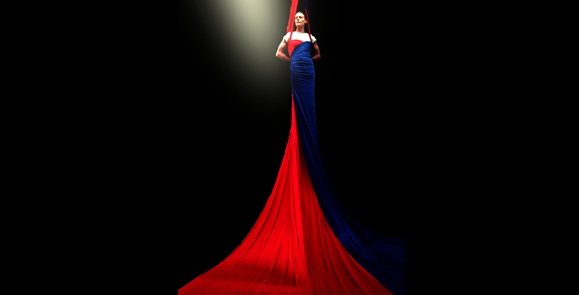mac, Birmingham; 8th October 2014
RoguePlay‘s adaptation of A’Level set-text Blood Wedding gives Lorca’s classic play a treatment that includes elements of aerial technique, flashes of capoeira, commedia masks and dance, and a text that reduces the essential tragedy of the original into a surface display of anger and mental instability, placing the Mother of the Bridegroom as chief protagonist.
I studied Blood Wedding for my Theatre Studies A’Level at the end of last century, and I remember the play as a dark and lyrical tragedy, where unspoken tensions lurk beneath the skin until wedding day pressure causes them to erupt in blood and death. The poetic nature of the original should lend itself perfectly to the imagery and emotional turmoil that can be expressed through aerial performance.
Unfortunately, I’m left confused, frustrated and unimpressed by RoguePlay’s production.
It reminds me of the reason I was so determined to start reviewing circus productions in the first place. While it’s certainly desirable to have a wide variety of work available, it’s important to have an idea of their relative quality. This keeps the industry standard high, and encourages audiences. If everything with a trapeze in it is able to pull up a marketing quote that claims ‘stunning aerial skills‘, then audiences who know their silks from their slings are likely to be disappointed, and stop coming to see new work in fear that it may turn out to be yet another case of the emperor’s new clothes.
There is nothing outstanding about the company’s aerials. They’re ok. The numbers don’t always make sense, or tell us any more of the story, and the choreography and equipment chosen often seems more a case of ‘what we’ve got’ than ‘what the play needs’. To me, this makes the routines boring, although I’m sure they must still seem exciting as a novelty to someone who’s never seen this type of performance up close.
The impression I get, watching the show, is that RoguePlay have tailored their adaptation so much to the visiting parties of students who study the text, that they forget to cater also to those of us who are less familiar with the story. When I go home and reread the play to try and make sense of the multi-casting and movement sequences, I get a different impression.
This is a new version of the story being told, with words cut and pasted from an uncredited translation. The fragmented scenes in this adaptation give us a basic plot where a young man is marrying a girl his mother doesn’t approve of, who then goes on to abscond with an ex-boyfriend. The mother then appears to cast a spell of vengeance to bring about their doom, but it is the two young men who kill each other (while the confrontation is left unwritten in the original play, here it’s bought to stage in a brief moment of capoeira and inappropriately ridiculous toy knives).
RoguePlay’s edit leads us to understand that the Mother (who also absorbs the roles of Death and the three choral Woodcutters) is the root of all her own troubles, caused by the bitterness in her heart. Whilst this is an interesting idea, I miss the inexorable pull of time and tides in Lorca’s original that leaves fate to blame for the bloodlust of men.
All the subtleties of withheld passions written into Lorca’s text are loosed from the opening moments of the show and laid bare; there is no space to get to know – or care about – the characters. The acting often boils down to pacing, sighing, and browbeating.
Of course, there are a few lifting moments, such as Anna Simpson’s playful and genuine engagement as the Maid and distorted physicality as the frozen Moon (although suitably disturbing, it would be nice to see more of this carried up into the accompanying aerial hoop routine too). A growing wedding dress that reminds me of NoFit State’s similar motif in Bianco draws an interesting analogy with hanging, but is laboured and ungainly in execution.
This is an ambitious project for the company of five to undertake themselves and, with the company’s two directors also playing the lead roles, I can’t help think that talents are all being stretched too thinly. As my father used to say, if a job’s worth doing, it’s worth doing properly. Go find a cast who could make this sing.
.
.




